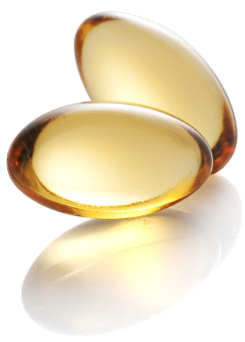Popular Articles
- Hair Loss Products - 25 Natural Treatments
- Advecia Supplement Facts
- Medications That May Interact with Advecia
- Review of Rogaine for Women
- Vitamin Deficiency and Hair Loss - The Facts!
- 14 Vitamins for Hair Loss & Thinning Hair
- Receding Hair & Beta Sitosterol
- Biotin for Hair Loss - Should You Try it?
- 6 Amino Acids for Hair Loss
- Sugar Linked to Increased Hair Loss Risk
- More Articles ...
 Vitamins to Slow Hair Loss in WomenIn This Article
Hair loss in women can produce dramatic results. Given that hair is a major part of beautification in women, it is endlessly treated with chemicals, regularly combed and constantly handled. All of these changes can stress the hair and cause breakages, the first sign of hair loss. It is important to start hair treatment as quickly as possible. For women, vitamins can go a long way in slowing down and even stopping hair loss. This article discusses the most important vitamins that can help.
Hair Growth and Hair LossAt any point in time, hair is being grown and lost on the scalp. Hair growth follows a cycle with 3 phases: anagen, catagen, and telogen. Anagen is the phase at which hair actively grows and it is the stage in which 90% of the hair on the scalp exists. Ideally, the anagen phase is the longest: a strand of hair can stay 2 – 8 years at this stage. In contrast, the catagen phase only lasts 2 – 3 weeks. During the catagen phase, hair follicles shrink, and hair loss results. The telogen phase is the resting phase. It takes 2 – 4 months during which hair does not grow or fall off. 10% of the hair on the scalp is either in the telogen or catagen phase. This small percentage is responsible for the 50 – 100 hair strands that fall off every day. However, when daily hair loss exceeds 100 hair strands, then the rate of hair loss will exceed the rate at which new hair grows and alopecia may be diagnosed. Therefore, counting the number of hair strands daily is one way to diagnose alopecia.
Such visual cues include finding tufts of hair on the pillow in the morning, discovering more than the usual amount of hair being left on the comb, and seeing more areas of the scalp when the hair is pulled back. While men generally lose hair from the crown or forehead, women’s hair starts thinning from the top half or third of the scalp. Hair loss in women can be caused by a number of factors. The most common factors include thyroid problems, autoimmune disorders, and hereditary hair loss or androgenic alopecia. Hair loss can also be caused by certain drugs, extreme stress, nutritional deficiencies, anemia, polycystic ovarian syndrome, psoriasis, and seborrheic dermatitis. Some other common causes of hair loss in women include pregnancy, menopause, sudden weight loss, surgery, and chronic illness. Besides these underlying diseases, female hair care treatments can also cause hair loss. These self-inflicted causes include certain hairstyles, flat irons, hard brushes, and hair products formulated with strong chemicals. It is important to catch hair loss early on. This is because hair loss becomes more difficult to stop and reverse the longer it has been left untreated. In the early stages, you can still try to slow down or stop hair loss with home remedies. Vitamins are one such natural remedies to help stop hair loss. These essential nutrients may delay that eventual visit to the dermatologist and even help you avoid the prescription hair loss medications like Rogaine. Discussed below are the most important vitamins for slowing and stopping hair loss in women. Vitamin AVitamin A does not work directly to stop hair loss but it can contribute significantly to the effects of the other vitamins discussed here.
In addition, vitamin A can keep the scalp moistened since it prevents the drying of the skin and the wilting of hair pores. It does this by increasing the secretion of sebum which is naturally produced in the skin. However, only low doses of vitamin A should be used to treat hair loss. This is because, at high doses, vitamin A can also cause hair loss. Vitamin CVitamin C provides multiple benefits for the hair. It prevents premature aging and also prevents hair from getting brittle and breaking off.
Secondly, the antioxidant property of vitamin C protects hair follicle cells from oxidative damage. It can help reduce and remove harmful free oxygen radicals that destroy these cells. In addition, vitamin C improves the absorption of nutrients essential to hair growth. These nutrients include glucosamine and iron. Lastly, vitamin C improves microcirculation in the skin. This means that it increases the distribution of oxygen and nutrient to hair follicle cells to support the growth of healthy hair. Vitamin DVitamin D is also known as the “sunshine vitamin”. It is naturally produced in the skin from cholesterol after sun exposure.
In both mice and human subjects, the presence of mutated vitamin D receptors has been shown to cause hair loss. This relationship between vitamin D receptors and hair growth suggests that vitamin D, its metabolites, and any other molecule that can activate these receptors will promote new hair growth and stop hair loss. Vitamin D receptors are found all over the body. The ones found in hair follicle cells can be activated to promote hair growth. While scientists doubt that simply taking vitamin D may not promote new hair growth since mutated vitamin D receptors do no respond well to vitamin D, natural medicine practitioners differ. And in fact, there is evidence that vitamin D supplementation can promote hair regrowth in cancer patients that have experienced hair loss following chemotherapy. Clearly, vitamin D provides some benefits for the hair. Therefore, while more studies are needed to determine if the vitamin can really help hair growth (some users already claim so), there is no harm in taking this vitamin. In fact, new health benefits are being discovered for vitamin D every year and it is currently the beloved vitamin. Vitamin EVitamin E shares the same benefits of vitamin C with regards to hair growth and it is an even more common ingredient in hair products.
It also supports hair growth by stimulating the formation of new blood vessels and, therefore, improving blood circulation in the scalp. More specifically, vitamin E increases the rate of oxygen uptake by hair follicle cells. Both of these effects are effective for fueling new hair growth and stopping hair loss. Lastly, vitamin E is known to boost the immune system. Therefore, it may protect hair follicle cells and prevent autoimmune attacks against these cells. B VitaminsThe B vitamins are essential for a long list of biochemical reactions and physiological processes in the body. They are required for cellular metabolism, as well as the syntheses and regulation of DNA, hormones, neurotransmitters, and other proteins.
For the hair, they prevent premature greying, oil the scalp, and give the hair a lush appearance while preventing hair strands from getting dry and brittle. Some of the B vitamins produce more specific benefits for hair growth. For example, vitamin B6 works with zinc to block the enzyme responsible for converting testosterone to dihydrotestosterone or DHT. DHT is the main androgen hormone responsible for androgenic alopecia. Vitamin B12 is also essential to hair and vitamin B12 deficiency can cause hair loss. Biotin is another B vitamin that has special importance in the hair growth cycle. Biotin is also known as vitamin B7 or vitamin H. Biotin deficiency causes hair loss which can extend to the eyebrows and eyelashes. Biotin supplementation can increase the rate of hair growth, increase hair volume, and help straighten the hair. Sourceshttp://www.medicinenet.com/hair_loss/page10.htm http://www.truehairgrowth.com/ http://www.webmd.com/skin-problems-and-treatments/hair-loss/features/women-hair-loss-causes
[+] Show All
|
| Next Article: 5 Hair Loss Forums & Websites |





 Besides counting the number of hair strands falling off, women may use visual cues to know when they are losing hair at an accelerated rate.
Besides counting the number of hair strands falling off, women may use visual cues to know when they are losing hair at an accelerated rate. As an antioxidant vitamin, vitamin A may protect the hair follicles from destruction by the oxidative stress mounted by free radicals and reactive oxygen species. Therefore, it can mop up oxidative species such as peroxides that are introduced to the scalp by the chemicals in female hair products.
As an antioxidant vitamin, vitamin A may protect the hair follicles from destruction by the oxidative stress mounted by free radicals and reactive oxygen species. Therefore, it can mop up oxidative species such as peroxides that are introduced to the scalp by the chemicals in female hair products. Because vitamin C is a nutrient required in the body for the production of collagen (the most important protein in the skin) and keratin (the most important protein in the hair), it can keep both the scalp and hair in good health.
Because vitamin C is a nutrient required in the body for the production of collagen (the most important protein in the skin) and keratin (the most important protein in the hair), it can keep both the scalp and hair in good health. Recent evidence suggests that
Recent evidence suggests that  Vitamin E is also an antioxidant vitamin that can protect hair follicle cells from oxidative damage.
Vitamin E is also an antioxidant vitamin that can protect hair follicle cells from oxidative damage. The B vitamins are, therefore, excellent for promoting general health.
The B vitamins are, therefore, excellent for promoting general health.